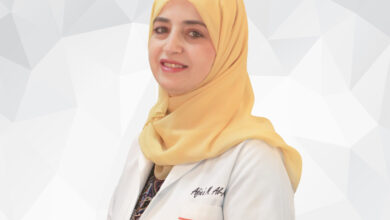Abbott Diabetes Academy
DIABETES:
Liberation Through Innovation
Diabetes levels are at an all-time high, with more than 425 million people living with the disease across the globe. To exacerbate matters, as many as 4 million people will have lost their lives to diabetes and its complications by the end of 2017, according to the IDF Diabetes Atlas 2017.¹
Like most Gulf countries, the situation is no better in the UAE; the high prevalence of diabetes resulted in having more than 1 million people with type 1 and type 2 diabetes (age 20-79). This means that one in every nine people are afflicted by the disease, with as many as 482,500 of those cases still undiagnosed.¹
While type 1 diabetes is more easily identifiable, although its cause and prevention are not known with currently available knowledge, it arguably types 2 diabetes that poses a greater threat as symptoms may only surface once complications have already set in. Furthermore, type 2 diabetes was only seen in adults until recently, but it is now increasingly prevalent among children.² Usually, there are several ways of managing the disease; healthy lifestyle choices, educating patients on self-management of diabetes and adherence to pharmacological interventions being some of them. However, it is also becoming increasingly clear that traditional technologies for self-management may no longer be adequate for the comprehensive management diabetes requires.
The conventional method of checking glucose levels approximately 6-8 times a day is still useful for patients with diabetes using insulin, but there is a notable data void between assessments. Depending on an individual and their lifestyle, their glucose levels may rise, drop or remain flat during that period and this crucial information sits in a veritable blind spot.
Another challenge with traditional methods of monitoring glucose levels as outlined earlier is ensuring patients adhere to clinical recommendations. Looking specifically at the region, according to a regional survey, more than half the residents of UAE, Saudi Arabia, and Kuwait feel anxious about having to prick their fingers multiple times a day, and a similar percentage believe testing glucose levels regularly interferes with the daily lives of people with diabetes. This underscores the need for a more convenient method to monitor glucose levels.³
Although the technology to gather glucose data, which, importantly, did not require multiple fingerprick calibrations, was not available with traditional self-checking methods, replacing routine fingerpicking is now entirely possible with flash glucose monitoring system such as Abbott’s FreeStyle Libre. The scope of glycemic data and ease of its collection makes flash glucose monitoring system paramount to more effective management of diabetes.
The Abbott FreeStyle Libre flash glucose monitoring system allows patients to monitor their interstitial fluid glucose via a sensor on the back of the upper arm, eliminating the need for routine finger pricking while delivering instant results*. The FreeStyle Libre sensor, which lasts for up to 14 days, automatically measures the patient’s glucose day and night and without the need for fingerprick calibration. FreeStyle Libre system typically delivers a user’s 8-hour glucose history together with a trend arrow to show if their glucose levels are steady, rising or dropping.
This technology provides a cutting-edge method of glucose monitoring to support an effective diabetes management program and helps doctors to make better-informed therapy decisions.
To further enhance the efficacy and scope of this innovative technology, Abbott recently launched the Abbott Diabetes Academy in collaboration with the Emirates Diabetes Society and Dubai Healthcare City to support healthcare professionals with breakthrough training on methods and solutions for more effective patient management.
With its mission to shift the paradigm in diabetes management and become one of the leading education and training partners for the regional public and private healthcare and diabetes community, the Abbott Diabetes Academy is providing practical tools which can be applied by endocrinologists, diabetologists, and educators to improve the management of diabetes.
Amer Haddadin, Regional Director, Abbott Diabetes Care, said: “There is an increasing occurrence of diabetes in the region, making its effective management all the more important. At Abbott, we identified some of the key issues that stood in the way of achieving that goal and addressed them. We are now able to gather actionable, real-time data without the associated inconvenience of fingerprick calibration. Not only does this substantially improve the quality of life of people with diabetes, through our academy, it provides healthcare professionals with deeper insight for better management of the disease. We are delighted to have the endorsement of the EDS and DHCC to make this academy a reality; it is an honor to be granted the support of such prominent organizations.”
Located in the heart of Dubai Healthcare City, the Abbott Diabetes Academy has devised an innovative program, designed in collaboration with the leading experts in the field, which includes cutting-edge solutions for disease management.
The program is made up of four learning modules, the first of which looks beyond HbA1c to assess current practices. The second module deals with understanding Ambulatory Glucose Profile (AGP), AGP as a reporting standard and clinical decision-making with AGP.
The third module addresses fundamentals of glucose monitoring and introduces new technology solutions, such as the Abbott FreeStyle Libre flash glucose monitoring system. The system integrates AGP and enables effective glucose data management. The program isn’t merely theory-based, using interactive and collaborative workshops as part of the curriculum to ensure that the entire program is as engaging as it is informative.
This course is completed with practical case studies, patient education and the standardization of glucose data reporting to make for a more personalized setting. Each group is limited to just 8 participants, promoting immersive discussions and a greater exchange of ideas and experiences between attendees.
“What Abbott has started with The Abbott Diabetes Academy is a huge step in the right direction, We’re thankful to them for starting this journey, and we hope it allows us to achieve the goal we are all looking for,” said Dr. Abdulrazzaq Al-Madani, President, Emirates Diabetes Society. Clinical practice tools and patient education materials can help physicians and their healthcare teams to effectively meet the needs of people with or at risk for diabetes.⁴
The Abbott Diabetes Academy encourages healthcare professionals to sign up via website: www.abbottdiabetesacademy-me.com and get equipped to better tackle what is quite possibly one of the biggest medical crises facing our generation and beyond.
For more information on Abbott FreeStyle Libre flash glucose monitoring system, visit www.freestylelibre.ae. Abbott is a global healthcare company devoted to improving life through the development of products and technologies that span the breadth of healthcare. With a portfolio of leading, science-based offerings in diagnostics, medical devices, nutritionals and branded generic pharmaceuticals, Abbott serves people in more than 150 countries and employs approximately 94,000 people. www.abbottarabia.com
www.abbottdiabetesacademy-me.com
References:
1.IDF Diabetes Atlas, Eighth Edition, 2017
2.WHO Diabetes fact sheet updated November 2017
3.YouGov Survey, 2017
4.National Institute of Diabetes and Digestive and Kidney Diseases (NIDDK).
*Disclaimer
A fingerprick test using a blood glucose meter is required during times of rapidly changing glucose levels when interstitial fluid glucose levels may not accurately reflect blood glucose levels, or if hypoglycemia or impending hypoglycemia is reported or the symptoms do not match the system readings.

















